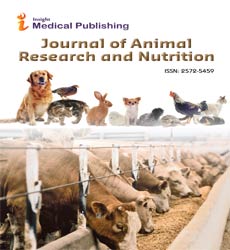Livestock Management in Supporting Sustainability and Economic Viability
Richard Chitoran*
Department of Animal Breeding? Wageningen University, Wageningen, The Netherlands
Richard Chitoran*
1Department of Animal Breeding, Wageningen University, Wageningen, The Netherlands
- *Corresponding Author:
- Richard Chitoran,
Department of Animal Breeding, Wageningen University, Wageningen, The Netherlands
E-mail: chitoran_r@gmail.com
Received date: September 20, 2024, Manuscript No. IPJARN-24-19744; Editor assigned date: September 23, 2024, PreQC No. IPJARN-24-19744 (PQ); Reviewed date: October 07, 2024, QC No. IPJARN-24-19744; Revised date: October 14, 2024, Manuscript No. IPJARN-24-19744 (R); Published date: October 21, 2024, DOI: 10.36648/2572-5459.9.5.140
Citation: Chitoran R (2024) Livestock Management in Supporting Sustainability and Economic Viability. J Anim Res Nutr Vol.9 No.5: 140.
Description
Livestock management has been a fundamental of agricultural systems worldwide for millennia, providing meat, milk, wool and other products need to human sustenance and economic livelihood. However, modern livestock management presents a complex set of challenges and opportunities for farmers, policymakers and society at large. These challenges range from ensuring food security and economic viability to addressing concerns about sustainability, animal welfare and public health. Proper livestock management, therefore, involves more than simply tending to animals; it is an intricate system that must balance ethical, environmental and economic imperatives.
Livestock production
One of the major issues in modern livestock management is the environmental impact associated with raising animals. Livestock farming is a significant contributor to greenhouse gas emissions, land degradation, water pollution and deforestation. With global climate change becoming an increasingly pressing issue, there is a growing consensus on the need for more sustainable livestock practices. Effective livestock management can help mitigate environmental impacts by promoting practices that optimize resource use and minimize waste. This can be achieved through better grazing practices, crop-livestock integration and adopting new technologies. For instance, rotational grazing, which involves moving livestock between different pastures, can help restore soil health and reduce the need for artificial fertilizers. Similarly, integrating livestock with crop farming allows for better nutrient cycling and reduces dependence on external inputs like synthetic fertilizers and pesticides.
Additionally, advancements in precision farming technologies are enabling more efficient use of water, feed and land resources. Sensors and data analytics can monitor the health and productivity of livestock, leading to more informed decisionmaking. For example, precision feeding systems can adjust the feed intake based on an animal’s growth and nutritional needs, reducing feed wastage and environmental impact. However, adopting these sustainable practices requires education, investment and often a shift in mindset among farmers. Governments and agricultural institutions must play a central role in encouraging farmers to adopt sustainable techniques through subsidies, training and technical support. Without such support, the transition to environmentally sustainable livestock management may remain a daunting challenge for many smallholder farmers, particularly in developing countries.
Livestock management
Another critical dimension of livestock management is ensuring the welfare of animals. Public awareness regarding animal rights and welfare has grown exponentially in recent years, pushing the livestock industry to rethink some of its traditional practices. Ethical livestock management seeks to provide animals with a quality of life that meets their physical, psychological and behavioral needs. Several factors influence animal welfare in livestock management, including housing, nutrition and disease control. For instance, livestock kept in intensive systems, such as battery cages or crowded feedlots, often face conditions that lead to stress, discomfort and the risk of injury or illness. Overcrowding and lack of proper ventilation can lead to the rapid spread of diseases, necessitating the overuse of antibiotics, which in turn contributes to antimicrobial resistance another growing global concern.
Ensuring animal welfare requires that livestock managers provide appropriate housing, sufficient space, proper ventilation and access to natural behaviors like grazing or socializing. Initiatives such as pasture-raised systems organic farming and free-range management focus on giving animals the opportunity to engage in these behaviors, which in turn results in healthier animals and better-quality products. Moreover, animal welfare isn’t solely about preventing cruelty; it is also connected to productivity and profitability. Healthier animals are more productive and require fewer veterinary interventions, leading to higher economic returns. Investing in welfare-oriented practices can thus enhance farm sustainability while responding to consumer demands for ethically produced products. One area that has gained attention is the role of certification systems that guarantee animal welfare standards. Labels like animal welfare approved or certified humane are becoming more prevalent, signaling to consumers that the products they purchase come from farms that prioritize animal well-being. Livestock managers who adopt these welfare practices are likely to see economic benefits, as consumers become increasingly willing to pay premium prices for products from humanely treated animals.

Open Access Journals
- Aquaculture & Veterinary Science
- Chemistry & Chemical Sciences
- Clinical Sciences
- Engineering
- General Science
- Genetics & Molecular Biology
- Health Care & Nursing
- Immunology & Microbiology
- Materials Science
- Mathematics & Physics
- Medical Sciences
- Neurology & Psychiatry
- Oncology & Cancer Science
- Pharmaceutical Sciences
